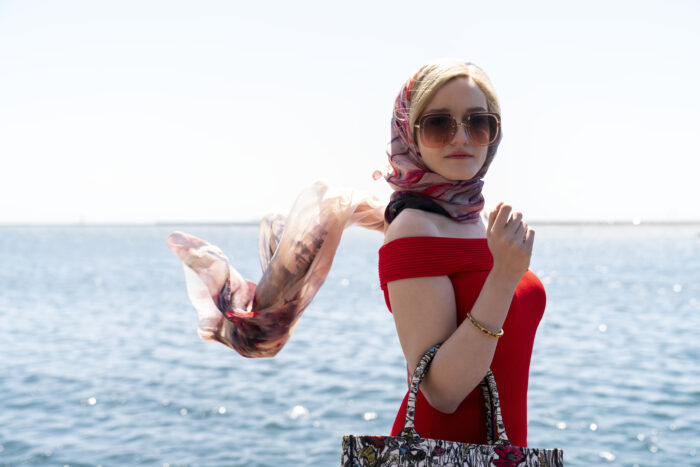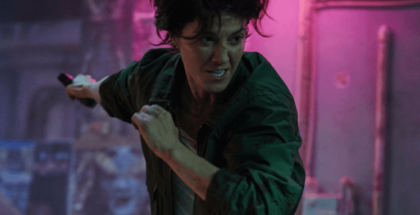Netflix UK TV review: Inventing Anna
Review Overview
Anticipation
10Journey
8Destination
7Helen Archer | On 11, Feb 2022
“It started with money, as it so often does in New York” reads the first line of Jessica Pressler’s article, How Anna Delvey Tricked New York’s Party People. Shonda Rhimes’ Inventing Anna begins with Megan Thee Stallion’s Rich playing over a montage of the printing presses that spew out the front page image of Delvey’s face, as, in voiceover, Delvey asserts: “You know me. Everyone knows me. I’m an icon. A legend.” And, with the release of this nine part series, it seems her legendary status is, indeed, guaranteed.
To say expectations are high for Inventing Anna would be something of an understatement. The dramatisation of the viral article about the now-infamous scammer of New York’s high society was the first on the slate for Shondaland’s $100m Netflix deal, and the buzz has been building since the project was announced. Based on the reporting of Pressler, who has previously had another magazine article adapted into the Jennifer Lopez film Hustlers, it’s also amongst a handful of new and upcoming releases based on present-day grifters, hitting the zeitgeist with merciless accuracy.
Starring Julia Garner – fresh from her outstanding performance in the final season of Ozark – as the eponymous swindler, Anna Delvey (aka Sorokin), who posed as a socialite in an attempt to steal millions of dollars, and Anna Chlumsky as reporter “Vivian”, a stand-in for Pressler, it charts the rise and fall of Delvey via the writing of Vivian’s article. It is both an exposé of Anna and a redemption story for Vivian, who, as the series opens, finds herself exiled to “Scriberia”, a windowless corner of the magazine office floor “where writers go to die”, after receiving a number of very public complaints about inaccuracies in an article she wrote some time before. Thus, two stories are intertwined, as the pregnant Vivian starts speaking to Anna in the visiting rooms of Rikers Island, where she awaits her trial, while also ingratiating herself to Anna’s lawyer, Todd (Arian Moayed), who has himself married into New York high society.
There’s a lot of material to cover and, after the initial set-up, the series is structured around the interviews Vivian conducts with Anna’s victims, whose stories are told in flashbacks. We start at the beginning, as Anna, new to New York, targets socialites via her connections in the fashion industry. Each character is gradually cut off from Anna’s world as they begin to realise they are being conned, but each establishes her modus operandi as she graduates from charging her $400k designer wardrobe to her mentor’s department store accounts to duping powerful financial institutions into bankrolling the ‘Anna Delvey Foundation’ – an exclusive $40 million arts club that she hopes to open in one of New York’s most iconic buildings.
In this way, we are introduced to characters in episodic vignettes, including socialites Nora (Kate Burton) and Talia (Marika Dominczyk), as well as finance lawyer Alan Reed (Anthony Edwards) and Anna’s ex boyfriend, the Futurist tech bro Chase (Saamer Usmani). Much of this is a wildly entertaining – although highly superficial – ride of stolen time in luxury hotels, yachts and private jets, and nights out with other high-profile fraudsters Martin Shkreli and Fyre Festival mastermind Billy McFarland. It’s not until later in the series that things take a darker turn.
Money – or at least the illusion of it – breeds money, something all successful scammers know only too well. While Anna is opaque in earlier episodes – unknowable, switching her image and her personality to be the person others want her to be – both her cunning and her vulnerabilities are laid bare when we are introduced to her friends Kacy (Laverne Cox), Rachel (Katie Lowes) and specifically Neff (a scene–stealing performance from Alexia Floyd). And although by then, Anna has conned some of the largest financial institutions in the world, it’s her relatively small-scale scamming of Rachel which would be her undoing.
Rachel here is portrayed as a “Becky” or “Karen” (as Neff calls her) – perfectly willing to take when the going’s good but all too eager to jump ship the minute things go south. And yet while much of Anna’s crime could be seen to be victimless – with American Express quietly refunding Nora, and Alan Reed being promoted despite being duped – it’s not until a fateful trip to Morocco that Anna’s fragile house of credit cards comes crashing down. As Rachel finds herself forced to use her Vanity Fair work account to fund the trip, Anna is cut off from any kind of support network, and it heralds the beginning of the end.
Through much of the series, it feels as though we find out more about the inner workings of the peripheral characters than we do about Anna herself. “Who is she?” is a question that haunts Vivian, as she creates a Pepe Silvia-style paranoia wall in her unborn child’s nursery. Anna is a mystery to be solved, to the extent that Vivian invents some sort of dodgy glamour for her, involving teenage money smuggling for a Russian gangster father. The reality, of course, is much more prosaic – she was just a probable narcissistic sociopath who knew what each of her victims wanted from her and gave it to them. The worst thing Anna could imagine herself described as is a “dumb socialite” and she seeks, via Vivian, to restore her reputation. And yet, by the end, Vivian feels she has missed the target of her story, which should be, she thinks, about “class, social mobility, identity under capitalism”.
She’s absolutely right, and unfortunately Rhimes misses these targets too. Inventing Anna is, for the most part, a riot of individualistic conspicuous consumption – all surface, pacy, with a banging soundtrack, although in some places overlong and overwrought – but it regurgitates the legend of Anna Delvey rather than undermining it; it’s a celebration of scamming rather than a critique of it. Vivian ultimately describes her article as “why scam culture is here to stay” and it is, indeed, difficult to see an end to it when it is so celebrated in contemporary culture, so long as we can attach a Girl Boss tag to it. That being said, it’s a near-perfect Netflix box set for a generation brought up on Instagram, where image trumps depth and the truth is never as it seems.
















